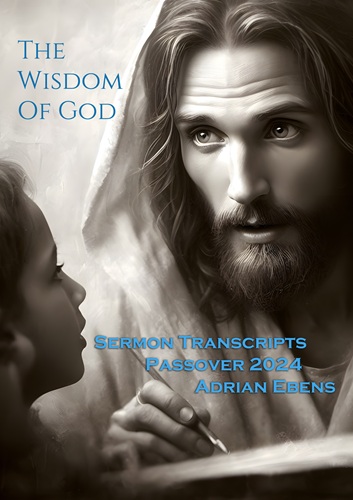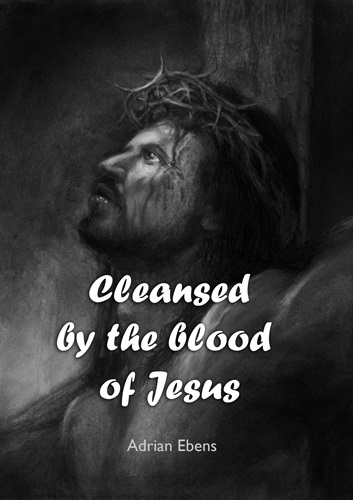Reply to Max Hatton's Question about the Trinity
You're getting ready to study the identity of God with your friend from work who happens to be a Mormon. Your Mormon friend explains his view of the "Godhead" and then proceeds to quote from Joseph Smith in support of his views. The thought quickly flashes through your mind, "this poor, deceived soul really believes his 'prophet' is the infallible interpreter of scripture." Your meeting ends cordially and you think nothing more about it....until you find yourself studying about the "Trinity" with a friend from your own Adventist church.
You mention that none of the early Adventist pioneers could join the denomination today because of their non-trinitarian beliefs. Your friend is ready however, for she proceeds opening the book "Evangelism" and quotes something about "the third person of the Godhead," and "three living persons of the heavenly trio." "Ellen White changed the denominations understanding about the Trinity when she wrote these words," your friend says with a determined look.
Not to be "out-quoted" you begin to reach for your own compilation of quotations, (which are many times more than hers). Then, you remember the "study" with your Mormon friend...and suddenly become ashamed of yourself for thinking that the "one with the most E.G.W. quotes" always wins the doctrinal debate.
Continuing this thought, Max Hatton has some valuable insights regarding how denominational Adventism has developed it's own unique "version" of the Trinity or Tritheistic doctrine. He wrote two books in defense of the Trinity doctrine (one for non-SDA, 2001; and one for SDA's, 2008). Max lives in Australia and his perspectives are widely accepted by Adventist leaders and members in that church division. Notice carefully what Mr. Hatton says:
"A Seventh-day Adventist Tritheistic Distortion of the Trinity:
"Some Seventh-day Adventists accept the full Deity of the Father, the Son, and the Holy Spirit but they do not accept that they all exist in the one Substance. They see each of them existing in the same sort of substance but try as they may they cannot avoid the charge of Tritheism. This is not the true doctrine of the Trinity. Maybe this is why I sometimes hear that we should not use the word Trinity but should rather refer to the Three Persons as the Godhead. Call it what you like it is not the true teaching of Scripture to have Three separate beings combined in a unity of character, love and purpose (and this and that) as the True God. I cannot escape the conclusion that three separate beings of separate substance are nothing less than three separate gods – Tritheism.
"If we want to be in harmony with Scripture we must accept that there are Three persons who occupy the same Substance (sometimes described as Essence). It seems to me that Tritheism is really a form of Polytheism and I am unable to offer acceptance to either of them. I have noticed for years that many Adventists who have said anything to me on the Trinity are really Tritheists....
"The early Ellen G. White seems to have been in harmony with her associates who did not believe in the Trinity. The Anti-Trinitarian Adventists today try to carry her early concepts through to the end of her life. I see a clear reversal in her thinking so that later in life she moved from being a non-Trinitarian to being a true Trinitarian. They try to marry the old Ellen G. White concepts with her later ones as though there was development but no real change. However, as we shall yet see there was considerable change many of her old concepts were left behind.
"Now a further thought. It seems to me that Jerry Moon and others have maintained the view that the three Members of the Trinity are human like figures. That being so they can’t for a moment think of the Three being in the one Substance. No, they think of them being separate but being united in such things as character and purpose. This recent thought of mine has helped me a lot to understand the reason why some Adventists have a Tritheistic type Trinity.
"If I am correct, and I see no reason to think that I am not, I have to also say that this type of Trinity does not come from a study of Scripture. Neither do I know of any reason from later Ellen White statements to suggest that she still held to the Members of the Trinity being humanlike figures. Ellen White certainly progressed and changed, yes she changed her understanding of what God is.
"I would like people who maintain this Tritheistic type of Trinity teaching to prove it from Scripture. Do we obtain our beliefs from the Bible or from Ellen G. White? Of course we should be taught by the Bible. Ellen White supported this approach as the following examples from her writings make clear:
'God will have a people upon the earth to maintain the Bible, and the Bible only, as the standard of all doctrines and the basis of all reforms…Before accepting any doctrine or precept, we should demand a plain “Thus saith the Lord.” The Great Controversy, page 595.
'The testimonies of Sister White should not be carried to the front. God’s Word is the unerring Standard. The Testimonies are not to take the place of the Word….Let all prove their positions from the Scriptures and substantiate every point they claim as truth from the revealed Word of God.' Evangelism, page 256.
"I do not accept that the conclusion that Moon comes to in the study of Ellen White is necessary anyway. Also, there are a few things from Ellen White that I would like explained to me by those who want to maintain this Tritheistic Trinity teaching:
"1. Is it not true that this Tritheistic Trinity is derived and developed from a gathering of early and then later comments by Ellen White rather than from the Bible?" (Max Hatton, http://web.mac.com/burn747/killing_God/The_Paper.html)
It is highly doubtful that Max Hatton received any definite response from Moon, Pfandl, or any other church leaders regarding his questions. Many of his questions are valid and deserve an answer. Alright Mr. Hatton, here are a few answers to your questions.
Hatton: "Maybe this is why I sometimes hear that we should not use the word Trinity but should rather refer to the Three Persons as the Godhead. Call it what you like it is not the true teaching of Scripture to have Three separate beings combined in a unity of character, love and purpose (and this and that) as the True God. I cannot escape the conclusion that three separate beings of separate substance are nothing less than three separate gods – Tritheism.
"If we want to be in harmony with Scripture we must accept that there are Three persons who occupy the same Substance (sometimes described as Essence). It seems to me that Tritheism is really a form of Polytheism and I am unable to offer acceptance to either of them. I have noticed for years that many Adventists who have said anything to me on the Trinity are really Tritheists....
Reply: We would agree that "Three separate beings" is Always Tritheism. Also, not just "many Adventists," but most Adventists who have subscribed to ANY form of "Trinitarian" profession, have NEVER believed in a "same Substance," (consubstantial) Trinity, (like you), but "are really Tritheists."
Hatton: "The early Ellen G. White seems to have been in harmony with her associates who did not believe in the Trinity. The Anti-Trinitarian Adventists today try to carry her early concepts through to the end of her life."
Reply: If this is correct, then (according to most modern non-trinitarian Adventists) Ellen White was always non-trinitarian her whole life as an Adventist. Also, while there may have been changes in her "emphasis" of certain relations about God, her original, over-all concept of Deity remained unchanged.
Hatton: "They [modern-non-trinitarians] try to marry the old Ellen G. White concepts with her later ones as though there was development but no real change. However, as we shall yet see there was considerable change many of her old concepts were left behind." "I see a clear reversal in her thinking so that later in life she moved from being a non-Trinitarian to being a true Trinitarian." "Ellen White certainly progressed and changed, yes she changed her understanding of what God is."
Reply: Let's assume Mrs. White did change her fundamental belief about God. If this were correct, she began as a Methodist, believing in their Trinitarian creed (which is almost exactly the same as your belief). She left Methodism, joined the Advent movement and eventually changed her beliefs in harmony with all her "semi-arian," non-trinitarian, co-workers. In other words, (according to modern Adventism, and yourself), she began her ministry believing in a "heretical" and erroneous view of God. Then, in her "mature" years, she made "a clear reversal in her thinking," "she changed her understanding of what God is" again, and "moved from being a non-Trinitarian to being a true Trinitarian" just as she started out in the Methodist church. Simply, Trinitarian, non-Trinitarian, back to Trinitarian once again. For those who believe that E.G.W. did change her belief about God in her "mature" years, your argument is simple and logical. We would only disagree on the final change in her thinking. It is much more probable, and consistent with the interpretation (or misinterpretation) of her later writings to conclude that she eventually "changed" from non-trinitarianism into accepting Tritheism as the "divine revelation" about God. Simply, Trinitarian (as a Methodist), non-trinitarian (first 50 years as an Adventist), then changed again to Tritheism (as a "mature" Adventist). According to this view, the only time Mrs. White did not believe a heretical view about God was during her short membership with the Methodist church as a young girl.
Hatton: "Is it not true that this Tritheistic Trinity is derived and developed from a gathering of early and then later comments by Ellen White rather than from the Bible?"
Reply: This is absolutely, positively true. We solute you Max Hatton for your frankness, candor, and honesty in this regard. Modern Adventist historians and scholars are willing to admit that denominational Adventism has changed from a non-trinitarian, to a fully Trinitarian church. They reference Ellen White as the initiator, and person primarily responsible for this change. But they cannot seem to grasp (as you do Mr. Hatton), that Mrs. White's "Trinity" quotes, along with modern Adventism's "interpretation" of those quotes, equate NOT to a One Divine Being---three person, ("one substance") Trinity as you propose; but rather "Three separate beings combined in a unity of character, love and purpose", which is a Tritheistic, "form of Polytheism" (in your own words). To be fair, an explanation of how Adventists have interpreted or misinterpreted the E.G.W. quotes is in order. It's really not that complicated and easily explained. Since Mr. Glyn Parfitt has written such an extensive work defending the modern Adventist "version" of the Trinity, we will use his interpretation (or misinterpretation) as a classic example. Quoting Mr. Parfitt:
"My copy of Webster’s Dictionary, 1828 ed., defines the word 'Trinity' as:
'The union of three persons in one Godhead, the Father, the Son, and the Holy Spirit.'
"Moreover, it gives the derivation of the word 'Trinity' as coming from the Latin, tres, 'three' and unitas, 'unity.'
"This definition of the word 'Trinity' and its derivation seems to me to be correct and unambiguous, referring to a unity of three Divine Beings in 'one Godhead.'" "The only scriptural conclusion that we can come to is that there are three distinct divine Beings, the Father, the Son, and the Holy Spirit, and that each are co-equal and co-eternal with the others:" (The Trinity: what has God revealed?: objections answered, 2008, Glyn Parfitt)
Parfitt's conclusion however, is NOT, and has NEVER been the Trinity doctrine, but always Tritheism. Mr. Parfitt has followed the unintentional error of so many before him. He mistakenly thinks that the terms "persons" and "beings" are synonyms, and therefore can be used interchangeably. All the major creeds, Catholic and Protestant, use the phrase "three persons" in the Trinity description. Yet, when creeds say: God...in "three persons," they never, ever, mean: "God in three beings." Rather, "God" is always one Divine Being (consubstantial) in three "persons," with the term "persons" meaning something other than tangible, independent, separate, "Beings."
"Personhood in the Trinity does not match the common Western understanding of 'person' as used in the English language—it does not imply an individual, self-actualized center of free will and conscious activity. Each person is understood as having the one identical essence or nature, not merely similar natures." (http://en.wikipedia.org/wiki/Trinity)
I don't know of ANY non-Adventist scholar or church historian (excepting Mormons) who equate the term "three persons" (hypostasis), synonymously with "three beings." "It should be noted that the Latin 'persona' is not the same as the English 'person' but is a broader term that includes the meaning of the English 'persona.'" (http://en.wikipedia.org/wiki/Hypostasis_(religion))
Even St. Augustine, (a militant defender of the Trinity doctrine), wrote a whole chapter about why you can't say the "three persons" are the same as "three beings": because it's the same as saying "three Gods." (The Trinity, By Saint Augustine, pp. 228-232)
Therefore, if one believes "persons" are "beings" when reading the ante-Nicene fathers or the historic creeds, you misinterpret "three persons" as "referring to a unity of three Divine Beings in 'one Godhead.'" As with the term "person" in the creeds, it cannot be proven that Mrs. White always used the term "person" synonymously with "being." With this in mind, it's not hard to understand that when reading Ellen White through "persons" = "Beings" glasses, one can only conclude that her "God," is "a unity of three Divine Beings in 'one Godhead.'"
Yet, if this were really her belief and teaching, Evangelical Protestantism would consider her Tritheistic heresy to be far worse than her previous "semi-arian" concepts. The extreme irony is quickly seen in this fact. LeRoy Froom and others have compiled Ellen White quotes which apparently endorse and support "Trinitarianism." They used her quotes over many generations as a "fire escape" from the heat forced upon Adventism from critics like Canright (and later Walter Martin), who accused the denomination of rejecting the Trinity.
The great myth of the "mature" Ellen White who endorses Trinitarian theology, has built its stone wall defenses broad and high. The original "fire escape" of E.G.W. quotes now becomes the "fire trap" from which there is no escape. And now, as the non-Adventist world critically examines modern Adventists "interpretation" of Ellen White's "Trinitarian" theology, they conclude the Trinity teaching of S.D.A.'s today is nothing more than a shallow facade. After the rank Tritheistic concepts are uncovered, it won't be long until Adventism is placed back upon the non-Christian, cult, watch-list once again. Undeniably, Tritheism has become Adventism's self-inflicted wound!
Going back to Mr. Parfitt's conclusions. We could quote Parfitt's many, many references of "three Divine Beings" as the truth of Trinitarianism, yet it would be entirely redundant and unnecessary. With due respect for the tremendous amount of effort put into his 800 plus page book, he doesn't seem to understand, nor differentiate between creedal Trinitarianism and the modern SDA Tritheistic belief. In other words, his book is one of the best apologetic defenses an Adventist has ever written; not of Trinitarianism, but rather Tritheism. Therefore, his book project will probably be "shut-down" before it receives any wide circulation. My guess is that no ABC book store in North America will sell it. One more quotation from Mr. Parfitt will suffice:
"Just how three individual beings can be 'one God' is a mystery that has not been revealed to us. Nevertheless this concept has been accepted as orthodox since the early days of Christianity and has been termed the Trinity. Various attempts have been made to explain or describe the mystery of 'God in three persons.' These explanations, I believe, are better left alone." (The Trinity: what has God revealed?: objections answered, 2008, Glyn Parfitt)
Hopefully this presentation has helped answer some of Max Hatton's questions. Before closing though, we would like to ask three more questions based on Gyln Parfitt's conclusions in the above quotation. Hopefully Mr. Hatton, or ANY other church leader, or member who has an opinion will respond:
1. According to Glyn Parfitt, the concept of "three individual beings" revealed as "one God" "has been accepted as orthodox since the early days of Christianity." Do you agree with this assessment?
2. According to Glyn Parfitt, the concept of "three individual beings" revealed as "one God" "has been termed the Trinity." Do you agree with this assessment?
3. Just as many have misinterpreted the creedal term "three persons" in one Godhead to mean: "three beings" in one Godhead; have many Adventists misinterpreted the writings of Ellen white in the same way?
-------------------------------------------------------------------------------------------------------------------
More info about Tritheism:
http://www.carm.org/tritheism
http://en.wikipedia.org/wiki/Tritheism
http://www.berith.org/essays/tritheism_and_christian_faith.html
http://www.bismikaallahuma.org/archives/2005/michael-servetus-the-errors-of-the-trinity/




